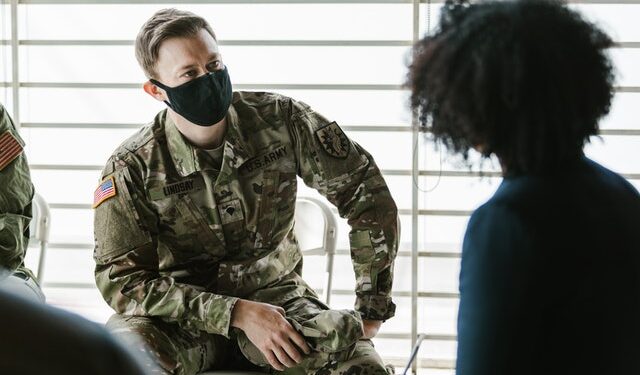
There has never been a more urgent need to combat, or ideally prevent, physician burnout, mental illness, and suicide. The idea of peer support, both in groups and 1:1 is not new. Arguably, hominids have been supporting each other in small groups since the dawn of humanity. Peer support for physician burnout has a growing evidence base, and is being implemented in multiple organizations around the country.
In this article, we explore a number of peer support programs and summarize the key elements required to develop safe and supportive spaces for the unique needs of physicians at risk of burning out.
Peer support happens when people who have similar experiences of something difficult come together to support each other. Relevant experiences that any person may undergo include traumatic events, mental health difficulties, or other forms of social or emotional distress. However, people involved in peer support will also have other shared characteristics, experiences, and interests.
The biggest challenges described by physicians which impact their mental wellbeing are largely systemic i.e. environmental, and therefore unique to those working there. And I argue elsewhere that corporate ‘resilience programs’ are an unhelpful diversion from the root causes.
For the purpose of this article, we are talking about the work and life experiences that are both common and unique to physicians as a group. Common in that we are all human beings with strengths and weaknesses. Unique because physicians alone undergo certain experiences – from rites of passage through med school and residency/specialist training, to exposure to human suffering and death in large quantities, to working within a modern healthcare system that sometimes seems to neither promote health nor care.
Physicians alone undergo certain experiences – from rites of passage through med school and residency/specialist training, to exposure to human suffering and death in large quantities, to working within a modern healthcare system that sometimes seems to neither promote health nor care.
While some physician personality traits and resultant coping mechanisms are important for preventing physician burnout, it is not for a lack of grit that we are burning out, getting ill, and dying of suicide at rates higher than the general public.
We intend to create physician burnout peer support networks across the country, and eventually the world. We will do this by building communities of support for and by doctors who understand what we’re going through, will not judge us, and who will listen as we share our stories in safe and confidential spaces.
Peer-to-peer support methods are successful at providing wellbeing support. A survey of 112 doctors showed that 88% would potentially seek support from a physician colleague if needed, in contrast to only 48% who stated they would access mental health professional support.
Fear is a major barrier to accessing support: fear of professional repercussions, licensing authority interference, confidentiality breaches, stigma, and appearing weak are the most commonly cited reasons.
Based on our own research, best practice from around the world, and our founders’ combined experience of group psychotherapy, 12-step fellowship groups, physician peer-support groups, and personal burnout, we have settled upon 5 principles for successful physician peer support programs.
They incorporate the above skillsets plus learnings from peer-support conversation, stress first aid, empathy, and active listening processes.
These are:
Anonymity tradition: “Who you saw here, what you heard here, let it stay here”.
Trust, confidentiality and anonymity (if so desired) are essential for physicians to feel safe.
We use high-quality secure technology, the vetting of members, and we are grateful for the help of our trained volunteer facilitators and moderators.
Safety means: we have choice and control, freedom to express ourselves and our diversity; we have choice and control in how we are involved. Lastly, equality demands two-way interactions: peers have opportunities to give and receive support.
One of our founding principles comes from another peer support network’s anonymity statement:
“Who you see here, what you hear here, let it stay here”.
Medical hierarchy begets fear and in some cases judgment and abuse. Some of us will take opinions from our seniors but not our students or residents. To our detriment. Hence we believe that our outside positions are not an issue inside the rooms. We are just physicians with different life experiences, each unique and valued. Our professional standing should not, we feel, come into it.
Additionally, equality links to safety, above.: we have choice and control, freedom to express ourselves and our diversity; we have choice and control in how we are involved. Lastly, equality demands two-way interactions: peers have opportunities to give and receive support.
“Judge not”, etc. We are, after all, just “Bozos on this bus” in these rooms.
Physicians are quite understandably reluctant to reach out for help.
Peer support, therefore, needs to be accessible to all physicians anytime anyplace. Technology enables that to a large degree. We will never turn a physician away for lack of funds.
While we want the lowest possible barriers to entry, we also need to ensure that it is indeed only physicians in our groups, to keep the groups safe. We need a balance of access vs safety. Hence, we have decided that a confidential vetting process is a necessary step.
Together we are stronger. Community means we are not alone in our struggles – and triumphs. Many of us made firm life-long friends through “anonymous” groups. Human connection is essential for wellbeing, and to tackle physician loneliness.
We trust that the same will happen here.
After much consideration, we have decided on these values that underly Physicians Anonymous.
In this article, we have illustrated our 5 principles for physician peer-support groups. In addition to groups, we intend to offer 1:1 peer support from fully trained fellow physicians.
At PA we are developing, learning, and iterating as we go. All feedback is welcome.
Check out our 1:1 coaching and peer support groups.
Reach out with any queries. We’d love to hear from our community.
